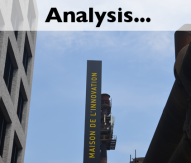
Analysis… The trouble with excellence
Dr Jack Stilgoe, senior lecturer in social studies of science at University College London, argues for a broader definition of scientific excellence and a greater focus on the science that matters.
The European Commission has placed great emphasis on excellent science as a means of cementing its competitiveness in the global market, allocating a total budget of over €24bn to a dedicated Excellent Science pillar within its latest research and innovation framework programme, Horizon 2020. Organisations and science funding bodies the world over are similarly declaring themselves pioneers of excellence in science, from the Royal Society in the UK to the European Molecular Biology Organization (EMBO) and the European Research Council.
But what does excellence actually mean, and what does it say about the type of science being funded and practised in Europe today?
Dr Jack Stilgoe, senior lecturer in social studies of science at University College London, is one of a number of voices challenging what is meant when we talk about excellence in science. At the EMBO Meeting 2015 in Birmingham, UK, Portal met with Dr Stilgoe, who currently serves as a member of the European Commission’s expert group on ‘science with and for society’, to discuss the need for a broader definition of excellence, a greater focus on the science that matters, and a more responsible set of metrics if Europe’s excellent science base is to truly make a difference to people’s lives.
How would you define excellence in science as it is understood today?
Excellence is one of those buzzwords that people use without ever really thinking about what it means. After all, who would be against excellence? But the reality is that excellence is increasingly being used in science policy discussions in a way that tells you almost nothing about the quality of science. Instead, it’s actually shorthand for a set of procedural constraints regarding how we think science should be governed.
My problem with it is that it tends to represent a view of scientific autonomy and a view of concentration of resources, both of which are rather problematic if you, like I am, are interested in the potential of science to make a difference to people’s lives – or responsible research and innovation, as it is known in Horizon 2020.
The argument I have been trying to make is that we must embrace a much broader sense of what scientific excellence actually is. We must consider not just science for science’s sake or science as assessed by scientists, but also that science which might be deemed of real societal benefit, albeit in rather unusual ways or in particular contexts. It’s time now to start using the word ‘excellence’ more inclusively, instead of just in reference to the kind of Nobel prize-winning science it tends to be associated with today.
In its own words, EMBO stands for excellence in life sciences. How would you like to see such an organisation redefine itself?
At the moment there is an uneasy alliance between the European Commission and other science policy organisations which are advocating scientific excellence on the one hand and tackling the grand societal challenges on the other.
Like a lot of scientific organisations, EMBO claims to be about excellence in science because that appeals to its own constituency of scientists. What I would like to see is scientific organisations that are bolder about saying ‘We support and nurture the science that matters’. That doesn’t at all stand in opposition to first rate, world class, groundbreaking science; it’s simply a recognition that just doing the good science in itself is only the first step. It’s job one, not job done; and actually organisations do have a responsibility to acknowledge that if we are going to realise the potential of science to make a difference to the world, then we need to stop pretending that just doing science for science’s sake is good enough. Yes, let’s do that science, absolutely. But let’s do all sorts of other science as well.
In what way might this new approach to excellence be achieved?
This is where the agenda for responsible research and innovation comes in. In order to broaden the sense of what high quality science actually looks like, we need to recognise that the science that scientists think is important is not necessarily the most responsible science. We need to rethink how we fund and manage scientific projects, we need to encourage scientists to collaborate across disciplines and countries, and we need to cultivate in science processes an openness that includes the perspectives of stakeholders, patients, civil society, and so on. Only then can we realise the positive potential of science without ignoring the ethical dilemmas that accompany it.
How far is this change already underway?
In some cases you can see real innovation in the way that science is being done: patient groups are having their voices heard in biomedical sciences, for example, and it has long been recognised in the environmental and agricultural sciences that local knowledge really matters.
But we must not be complacent and say that science is already responsible. I like scientists and I think that scientists on the whole are responsible citizens, but they can sometimes be reluctant to listen to ideas about extending their responsibilities, and we must try to encourage that.
Is there a new set of criteria you would like to see put in place to help encourage more responsible science?
What we have seen in a number of countries which fund a lot of science, the UK in particular, is the creation of various forms of assessment metrics and audits that enable decision makers to get a feel for whether they are getting value for money. I am in favour of that because a large amount of taxpayers’ money is being spent on science, so some form of assessment is entirely legitimate. It’s just a question of what we are measuring and what those measurements mean for the science that gets funded.
The Research Excellence Framework is a new system in the UK for assessing the quality of research in higher education institutions. In its last iteration the REF added an impact criterion to the criteria of excellence, which is simple to assess. It’s easy enough to determine whether scientists are evaluating the importance of a piece of science according to a particularly narrow set of criteria because there are already a number of citations, metrics, and measurements that can tell us.
Scientists know that those metrics don’t capture everything and they may skew the system in their favour, for instance by encouraging highly disciplinary areas of scientific research and discouraging interdisciplinary areas.
The question therefore now becomes ‘can we broaden those metrics?’ Can we come up with a set of responsible metrics that recognise the problems with narrow measures of audit, and that acknowledge that there are all sorts of ways by which we might assess, as democratic decision makers, what counts as excellent science?
Metrics for me are absolutely key.
Dr Jack Stilgoe
Senior Lecturer in Social Studies of Science
University College London
https://jackstilgoe.wordpress.com
This article first appeared in issue 8 of Horizon 2020 Projects: Portal, which is now available here.




